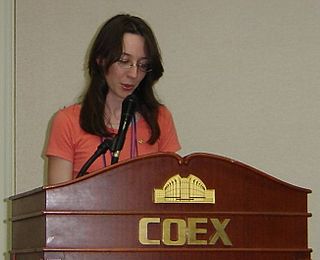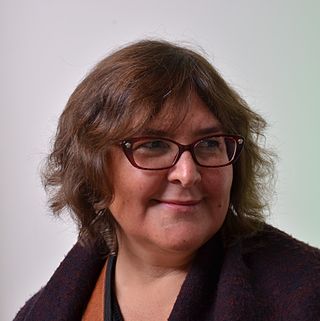Related Research Articles
Participatory democracy, participant democracy or participative democracy is a form of government in which citizens participate individually and directly in political decisions and policies that affect their lives, rather than through elected representatives. Elements of direct and representative democracy are combined in this model.

Citizen journalism, also known as collaborative media, participatory journalism, democratic journalism, guerrilla journalism or street journalism, is based upon public citizens "playing an active role in the process of collecting, reporting, analyzing, and disseminating news and information." Similarly, Courtney C. Radsch defines citizen journalism "as an alternative and activist form of news gathering and reporting that functions outside mainstream media institutions, often as a response to shortcomings in the professional journalistic field, that uses similar journalistic practices but is driven by different objectives and ideals and relies on alternative sources of legitimacy than traditional or mainstream journalism". Jay Rosen offers a simpler definition: "When the people formerly known as the audience employ the press tools they have in their possession to inform one another." The underlying principle of citizen journalism is that ordinary people, not professional journalists, can be the main creators and distributors of news. Citizen journalism should not be confused with community journalism or civic journalism, both of which are practiced by professional journalists; collaborative journalism, which is the practice of professional and non-professional journalists working together; and social journalism, which denotes a digital publication with a hybrid of professional and non-professional journalism.

Citizen Participation or Public Participation in social science refers to different mechanisms for the public to express opinions—and ideally exert influence—regarding political, economic, management or other social decisions. Participatory decision-making can take place along any realm of human social activity, including economic, political, management, cultural or familial.

E-democracy, also known as digital democracy or Internet democracy, uses information and communication technology (ICT) in political and governance processes. The term is credited to digital activist Steven Clift. By using 21st-century ICT, e-democracy seeks to enhance democracy, including aspects like civic technology and E-government. Proponents argue that by promoting transparency in decision-making processes, e-democracy can empower all citizens to observe and understand the proceedings. Also, if they possess overlooked data, perspectives, or opinions, they can contribute meaningfully. This contribution extends beyond mere informal disconnected debate; it facilitates citizen engagement in the proposal, development, and actual creation of a country's laws. In this way, e-democracy has the potential to incorporate crowdsourced analysis more directly into the policy-making process.
Alternative media are media sources that differ from established or dominant types of media in terms of their content, production, or distribution. Sometimes the term independent media is used as a synonym, indicating independence from large media corporations, but this term is also used to indicate media enjoying freedom of the press and independence from government control. Alternative media does not refer to a specific format and may be inclusive of print, audio, film/video, online/digital and street art, among others. Some examples include the counter-culture zines of the 1960s, ethnic and indigenous media such as the First People's television network in Canada, and more recently online open publishing journalism sites such as Indymedia.
Internet activism involves the use of electronic-communication technologies such as social media, e-mail, and podcasts for various forms of activism to enable faster and more effective communication by citizen movements, the delivery of particular information to large and specific audiences, as well as coordination. Internet technologies are used by activists for cause-related fundraising, community building, lobbying, and organizing. A digital-activism campaign is "an organized public effort, making collective claims on a target authority, in which civic initiators or supporters use digital media." Research has started to address specifically how activist/advocacy groups in the U.S. and in Canada use social media to achieve digital-activism objectives.

Participatory budgeting (PB) is a type of citizen sourcing in which ordinary people decide how to allocate part of a municipal or public budget through a process of democratic deliberation and decision-making. Participatory budgeting allows citizens or residents of a locality to identify, discuss, and prioritize public spending projects, and gives them the power to make real decisions about how money is spent.
Social peer-to-peer processes are interactions with a peer-to-peer dynamic. These peers can be humans or computers. Peer-to-peer (P2P) is a term that originated from the popular concept of the P2P distributed computer application architecture which partitions tasks or workloads between peers. This application structure was popularized by file sharing systems like Napster, the first of its kind in the late 1990s.
Netroots is a term coined in 2002 by Jerome Armstrong to describe political activism organized through blogs and other online media, including wikis and social network services. The word is a portmanteau of Internet and grassroots, reflecting the technological innovations that set netroots techniques apart from other forms of political participation. In the United States, the term is used mainly in left-leaning circles.

Citizen media is content produced by private citizens who are not professional journalists. Citizen journalism, participatory media and democratic media are related principles.
Electronic participation (e-participation) refers to the use of ICT in facilitating citizen participation in government-related processes, encompassing areas such as administration, service delivery, decision-making, and policy-making. As such, e-participation shares close ties with e-government and e-governance participation. The term's emergence aligns with the digitization of citizen interests and interactions with political service providers, primarily due to the proliferation of e-government.
Participatory media is communication media where the audience can play an active role in the process of collecting, reporting, analyzing and disseminating content. Citizen / participatory journalism, citizen media, empowerment journalism and democratic media are related principles.
Radical democracy is a type of democracy that advocates the radical extension of equality and liberty. Radical democracy is concerned with a radical extension of equality and freedom, following the idea that democracy is an unfinished, inclusive, continuous and reflexive process.

The Participatory Politics Foundation (PPF) is a United States non-profit organization whose mission is to preserve U.S. democracy. It works to increase public participation by, among other means, modernizing the political system through technological advancements that help connect lawmakers and citizens. The non-profit opened in February 2007.
TechPresident is a nonpartisan political website founded by Andrew Rasiej and Micah Sifry with the idea of tracking how the Internet is impacting U.S. political campaigns. It was launched on February 12, 2007 to monitor the United States presidential election of 2008. The site follows how the campaigns are utilizing new Internet-based strategies and how citizens are creating content, such as YouTube videos and Facebook groups, using the social media technologies.
May First/People Link (MF/PL) is a non-profit membership organization that uses mutual aid to provide Internet services, such as web hosting to progressive organizations and individuals. Founded in 1995 and based in New York City, MF/PL is one of the Internet's oldest progressive organizations. A member of Association for Progressive Communications, MF/PL directors, leaders, and members agree upon principles of progressive use of technology, outlined by a Statement of Unity.

Radical media are communication outlets that disperse action-oriented political agendas utilizing existing communication infrastructures and its supportive users. These types of media are differentiated from conventional mass communications through its progressive content, reformist culture, and democratic process of production and distribution. Advocates support its alternative and oppositional view of mass media, arguing that conventional outlets are politically biased through their production and distribution. However, there are some critics that exist in terms of validating the authenticity of the content, its political ideology, long-term perishability, and the social actions led by the media.
Online deliberation is a broad term used to describe many forms of non-institutional, institutional and experimental online discussions. The term also describes the emerging field of practice and research related to the design, implementation and study of deliberative processes that rely on the use of electronic information and communications technologies (ICT).
Politics and technology encompasses concepts, mechanisms, personalities, efforts, and social movements that include, but are not necessarily limited to, the Internet and other information and communication technologies (ICTs). Scholars have begun to explore how internet technologies influence political communication and participation, especially in terms of what is known as the public sphere.

Anriette Esterhuysen is a human rights defender and computer networking pioneer from South Africa. She has pioneered the use of Internet and Communications Technologies (ICTs) to promote social justice in South Africa and throughout the world, focusing on affordable Internet access. She was the Executive Director of the Association for Progressive Communications from 2000 until April 2017, when she became APC's Director of Policy and Strategy. In November 2019 United Nations Secretary-General António Guterres appointed Esterhuysen to Chair the Internet Governance Forum’s Multistakeholder Advisory Group.
References
- ↑ The Nation: The Rise of Open-Source Politics. November 4, 2004
- ↑ Mother Jones: Politics 2.0: Fight Different. June 20, 2007
- ↑ BBC Radio 5 Live: American Politics 2.0. 24 March 2007
- ↑ GigaOM: Web 2.0 gives birth to Politics 2.0. March 19, 2007
- ↑ TechCrunch: When will Politics 2.0 happen?. December 12, 2006
- ↑ techPresident: No More Blog, Blog, Blog! June 27, 2007
- ↑ Mother Jones: Interview with Nicco Mele: Co-founder of EchoDitto, Former Webmaster for Howard Dean. June 29, 2007
- ↑ Mother Jones: Crashing The System. June 20, 2007
- ↑ Mother Jones: Interview with Jimmy Wales: Wikipedia Founder. June 29, 2007
- ↑ Fuch 383 as qtd. in the Guardian
- ↑ Franklin 376
- ↑ Mother Jones: Masters of Their Domain. June 20, 2007
- ↑ Mother Jones: Interview with Nicholas Lemann: Dean of the Columbia School of Journalism. June 29, 2007